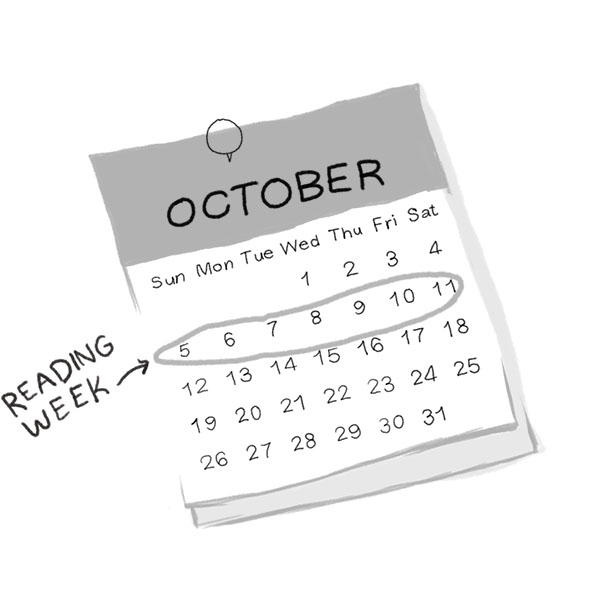Dennis Bayazitov | Assistant News Editor
Featured image | Rowan Campbell
Last Thursday, the York Senate board voted in favour of passing a proposal put forward by the YFS for a full-week reading week for students. Reading week will now be four days, instead of this year’s two, following Thanksgiving Monday—to begin in fall 2018.
In the past, this has been the way reading week was originally structured—however, it had been shortened down to two days in previous years.
I seriously doubt I am the only York community member who feels this way when I say that shortening reading week was a disadvantageous decision for students—based on several factors—that should not be repeated again in the years to come.
Before, this full-week reading week structure was altered because it was not deemed useful—the reasoning being that it was too big a break to be scheduled so early in the term.
Students are not yet given any major assignments at this time, as they are barely through even a third of the course. Additionally, midterms are usually at the end of October—around now.
The primary justification for this reduction was that students do not even cover enough material to begin thinking about their research papers and larger assignments due near the tail-end of their courses.
Further, another initial motivation for scheduling reading week this way—the way it will ideally be scheduled from now on and for good—was for the sake of first- and second-years.
In the past, the Senate noticed that first-years who go home for Thanksgiving typically do not return until only after the holidays. So, truly, reading week was tailored the most to them.
However, the Senate later realized that it was not the best timing for upper-level students and subsequently formed a conversation about which student population is best served when—unfortunately, there was no one perfect time.
While I would certainly agree that many students might not, in fact, yet reach the halfway point in their studies by Thanksgiving Monday, the advantages of a full-week reading week widely extend past merely academic success.
The truth is that not every student has the luxury of a comfortable schedule, workload (both academic and professional), or living situation, and would greatly benefit from a full week off to tend to non-school-related personal priorities. I imagine there are many students who juggle many such responsibilities, for whom such a breather would be invaluable.
In particular, I am certain many students working to make ends meet, who may also be paying for their own tuition, would gladly oblige in taking on additional work shifts during these days off given the opportunity, which they might not otherwise be able to do.
The most significant plus-side of all, however, has to be the increased freedom students will have to better recuperate from—and address—their elevated stress levels. This time of year is prime time for students to focus on mental health, to dedicate attention towards their home life and plan for their future academic and personal obligations.
Could it not be argued that by shifting two dates in our academic calendar, we are playing a relatively small, but crucial role, to help alleviate such conspicuous strain on the student body?
This meaningful decision to pass comes at a time when several fellow Ontario universities have also begun to adopt full-week reading week models as of 2016 and 2017, including U of T, Ryerson, Brock, and Western—a model that seems to be working.
It appears that the benefits of a full-week reading week heavily outweigh its downsides, for both students and faculty. York ought to take note of the positive reception and success of this decision, and firmly stand by it come next year—and the many years to come.




